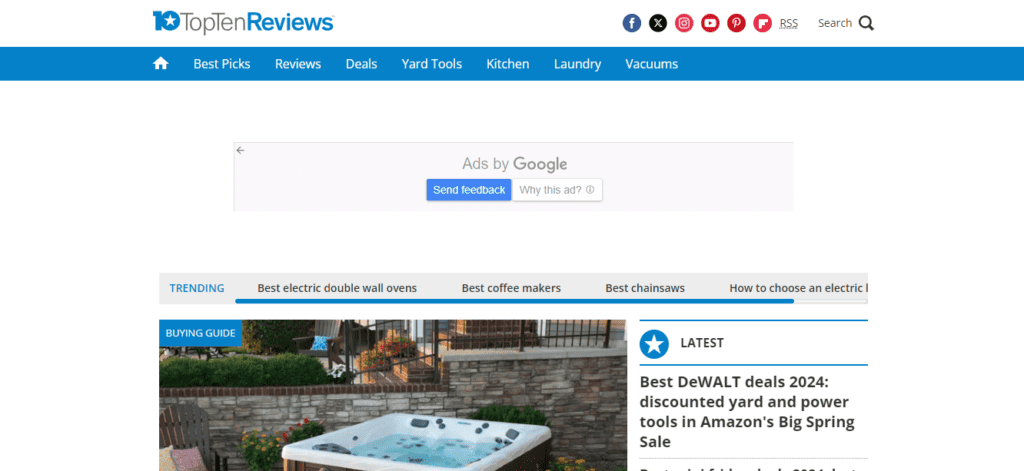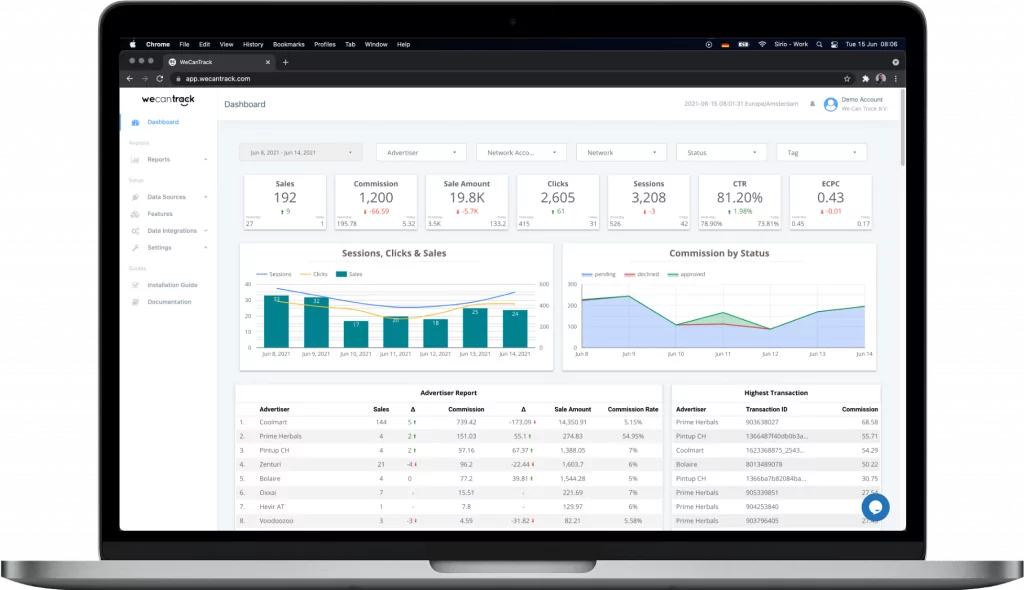A review website is a great way to promote opinions, help engage in the community, or even turn passion into a profitable business.
Be it your intention in doing reviews about restaurants, gadgets, movies, or any products and services, a niche review site still looms on its credibility, user-friendliness, and quality of its content to be known.
So, here’s a step-by-step guide on setting up a review website: everything from choosing the niche and the domain name to creating great content and monetizing the site.
How To Create A Review Website Overview
5 Steps How To Create A Review Website
Here are five steps to create a review website. Remember, it takes time to create a site, so be patient, and you’ll start seeing the results.
Step 1: Setting Up Your Website
Setting up a review website typically involves purchasing a domain name and hosting. A domain name is the web address people use to find your website, such as www.example.com.
You can register your domain name with many providers, such as GoDaddy, Namecheap, 1&1, and so on. These providers offer various pricing options, such as yearly or multi-year registration.
You will have several options for hosting, such as shared hosting, VPS hosting, or dedicated hosting. Shared hosting is a good option if you’re just starting out as it’s the most affordable, it’s where your website is hosted on the same server as other websites.
VPS (Virtual Private Server) hosting is a step up from shared hosting, it gives you more control and resources. Dedicated hosting is the most expensive option, it’s where you have your own server and resources, it’s perfect for high-traffic sites. Some well-known providers of hosting services include Bluehost, HostGator, and SiteGround.
Once you have a domain name and hosting, you will need to install a content management system (CMS) such as WordPress, Drupal, or Joomla, which allows you to easily manage and update the content on your website.
It can be helpful to choose a theme that is optimized for review websites. This can save you time and ensure your website looks professional and is easy to navigate. Some popular website builders and CMS platforms, like WordPress, Wix, and Squarespace, also have many themes that are already optimized for review websites; you can choose them according to your preference.
You can also take a quick look at our best WordPress themes for affiliate marketing and draw inspiration from them.
Please note that the providers I mentioned are just examples; you can choose other providers that fit your needs and budget. Additionally, when choosing a hosting provider, you may want to read customer reviews and research to ensure they have a good reputation, offer good customer service, and have a money-back guarantee or an easy way to cancel the service.
Step 2: Creating User-Friendly Content
Creating user-friendly content is crucial for any review website. This includes product comparison charts, detailed product descriptions, and user-generated ratings and reviews.
Having high-quality images, videos, and interactive elements like quizzes and polls can also help make your website more engaging and increase the likelihood of people returning to it.
It is important to organize your content clearly and logically to make your website easy to navigate. Use headings, subheadings, and bullet points to break up your text and make it easy to read.
Optimize your images and videos by using descriptive file names and adding alt tags. This can improve your website’s accessibility and help it rank better in search engine results.
User-generated reviews can be a great addition to your website. They can be a reliable source of feedback for your visitors and also increase engagement. Make sure to have a clear and easy-to-use system for visitors to submit their reviews and a review process in place to ensure that the reviews are legitimate and relevant.
Think about the user experience. Use a responsive design, optimize the site load time, make it easy for users to find the information they are looking for, share your content on social media, have a clear and easy-to-use navigation menu, and so on. Consider diversifying traffic sources for affiliate marketing, review, and optimize websites.
These elements will help make your website user-friendly and increase people’s likelihood of returning to it.
Step 3: Search Engine Optimization (SEO)
Search engine optimization (SEO) is an important factor to consider when creating a review website. This means optimizing your website for keywords related to your niche and creating high-quality, unique content likely to be shared and linked to.
Optimizing your website for SEO can help ensure that it appears at or near the top of search engine results pages when people search for products or services related to your niche. This can help increase traffic to your website and make it more visible to potential customers.
One of the most important things to consider with SEO is keyword research. This involves identifying the keywords people are searching for when looking for products or services related to your niche. You can use tools like Google Keyword Planner, SEMrush, or Ahrefs to research keywords.
Once you have a list of keywords, you can start optimizing your website for them. This can include things like including them in your page titles, headings, and content, as well as meta tags and alt tags for images.
Another important aspect of SEO is link building. This involves getting other websites to link to your website. This can help improve your search engine rankings and drive more traffic to your website.
Some other tools you can use for SEO optimization: Google Analytics, Google Search Console, Yoast, All in one SEO Pack, and so on. These tools help you monitor your website performance, report and fix errors, and provide guidance on improving your website SEO.
It’s important to note that SEO is a continuous process, and it takes time to see results. You can also check out our SEO tips for affiliate marketing websites. However, if you put in the effort to optimize your website, you can improve your search engine rankings and drive more traffic to it.
Step 4: Gaining Exposure
Gaining exposure for your review website is crucial for attracting more visitors. This can include things like social media marketing, paid advertising, and link building.
Social media marketing can help you reach a large audience and increase brand awareness. Platforms like Facebook, Instagram, and Twitter can be great places to promote your website and interact with potential customers.
Paid advertising like Google Adwords or Facebook ads can be a great way to quickly increase your website’s visibility. However, it’s important to set a budget and track your results to ensure a good return on your investment.
Link building is getting other websites to link to your website. This can help improve your search engine rankings and drive more traffic to your website.
Step 5: Monetizing Your Website
Affiliate marketing is one of the most popular ways to monetize a review website. In affiliate marketing, you earn a commission for promoting other people’s or companies’ products.
You can include affiliate links in your reviews. When someone clicks on those links and makes a purchase, you earn a commission.
You can join several affiliate networks, including Amazon Associates, ShareASale, Commission Junction, and Rakuten Marketing. Each network offers a different selection of products and services to promote, so you’ll want to find the one that best matches your niche.
Another way to monetize your review website is through advertising. Ad networks like Google Adsense, Media.net, and Infolinks allow you to display ads on your website and earn money when people click them.
You can also use your review website to sell your products or services, like e-books, courses, or consulting services.
Sponsored posts and reviews are also a great way to monetize your website. Brands will pay you to write posts or reviews about their products. Additionally, you can use your website to promote and sell physical products, like a book or a guide. As your website grows, you can expand it into a store and start selling more products.
It’s important to note that not all of these methods will apply to every website and that your choice of monetization strategy will depend on your website niche, target audience, and traffic. In addition, it is important to always disclose to your visitors that the content you produce is sponsored and you may be earning from it.
Step 6: Setting Up Conversion Tracking
Conversion tracking and having an affiliate dashboard is a valuable tool for review websites because it allows them to measure the effectiveness of their marketing efforts and optimize their strategies for maximum return on investment.
By tracking conversions in an affiliate dashboard like the one wecantrack can provide, you as a review website owner can gain insights into the actions that users take on your site, such as clicking on a product link and matching the conversion data with the traffic data. This information can be used to identify areas of improvement and tailor marketing campaigns to better target specific audiences.
One key benefit of conversion tracking for review websites is that it allows you to measure the success of your affiliate marketing campaigns. Affiliate marketing is a popular method for review websites to monetize their content, as it enables you to earn a commission for each product sold through your site.
Another benefit of conversion tracking for review websites is that it can help you improve the user experience on your site. By tracking users’ actions, you can identify areas of your site that may be confusing or have low conversion rates. You can then make changes to improve your site’s usability and increase the likelihood of conversions.
In addition, conversion tracking can help you to optimize your search engine optimization (SEO) efforts.
Finally, conversion tracking is also essential for understanding the effectiveness of different advertising channels. You, as a review website owner, can track your conversion on different platforms like Google, Facebook, and other marketing channels, compare them to find the most successful one, and optimize the ad targeting accordingly.

Key elements for a trustworthy review site include unbiased opinions, real-life examples, and a clear presentation of affiliate relationships to maintain transparency with the audience.
4 Examples Of Successful Review Websites
Affiliate marketing is a popular way to monetize review websites, and many successful sites have been built on this model. Here are some examples of affiliate review websites that have gained traction in various niches:
Wirecutter
Wirecutter is a product recommendation service from The New York Times. This site combines independent research with testing to offer product reviews and recommendations on various product categories, including electronics, appliances, and home goods.
They monetize their service through subscriptions ($5 every four weeks or $40 annually) and affiliate marketing programs, mainly Amazon.
The Wirecutter was founded in September 2011 by Brian Lam.
In October 2016, The Wirecutter and its sister site, The Sweethome, were acquired by The New York Times Company for a reported $30 million.
Both sites were combined into a single site in 2017, namely Wirecutter, and The Sweethome ceased to exist.
Brian is known for his contribution to helping Gizmodo grow when he became editorial director in 2008. By the time he left Gizmodo in 2011 to start The Wirecutter, Gizmodo was getting more than 220 million page views monthly.
Many consumers view Wirecutter as one of the best and most respected product recommendation services in the U.S. The industry even coined a name for it, the Wirecutter effect – it refers to the increase in sales a retailer experiences when one of their products gets the thumb up from Wirecutter.
Wirecutter aims to recommend high-quality, fit-for-purpose products that are competitively priced and do not contain rarely used features.

If you are doing right by the reader and putting them at the center of everything, then the rest will follow.
CNET.com
This technology news and review website offers expert reviews and buying guides for an extensive range of products. They earn commissions through affiliate partnerships with retailers like Amazon and Walmart.
The idea for CNET was conceived in 1993 by Halsey Minor and former classmate Shelby Bonnie. Shelby contributed $25,000 in seed funding, and Halsey obtained a $50,000 investment from his former boss.
Another notable investor was Paul Allen, co-founder of Microsoft, who owned 26 percent of CNET before the company went public on July 3, 1996.
Today, CNET is a Red Ventures company that acquired CNET in 2020 from ViacomCBS for $500 million. (CBS, before its merger with Viacom in 2019, acquired CNET and other related sites in 2008 for $1.8 billion).
Although some people still think CNET is all about computers, the company has significantly expanded its interests since 1994.
For example, in 1996, CNET added news and gaming coverage. In 2000, the company expanded its tech coverage to include mobile phones. Next came car reviews in 2004, how-to tech advice in 2011, food and wellness in 2015, and crypto and credit cards in 2020.

Our experts give you news, tools, and advice that help you navigate our ever-changing world. Because when you understand what is going on, you can do something about it.
CNET reaches consumers through many different platforms. For example, they get 90 million video views and 67 million website visitors monthly. In addition, they have 14 million followers on social media platforms – Facebook, Instagram, Twitter, YouTube, and TikTok.
PCMag.com
This website provides in-depth reviews and ratings of technology products, from laptops and smartphones to software and services. They generate revenue through affiliate partnerships with retailers like Amazon.
PCMag (then called PC) was founded in 1982 by David Bunnell as a print magazine – the first issue of PC was February-March 1982.
(The word Magazine was added in June 1982 when the third issue was published).
The magazine was an overnight success. Unfortunately for David Bunnell, their financial backer, Tony Gold, sold the rights to PCMag to Ziff Davis Publishing in November 1982 without his consent.
PCMag.com was first published online in 1996. Its home page contains links to all Ziff Davis publications.
Twenty-seven years after the first print issue appeared in 1982, the last print issue hit the shelves in 2009 – by then, 80% of their revenue was from online earnings.
PCMag has been an authority on technology from its first day and provides independent reviews of 2,000+ products yearly.
According to Similarweb, PCMag.com gets over 20 million visits monthly.
TopTenReviews.com
This website offers side-by-side comparisons and reviews of various products, including electronics, home goods, mortgage refinance companies, and services like web hosting.
Their top source of income is affiliate marketing, followed by advertising, sponsorships, and lead generation.
Top Ten Reviews and the Purch Group (formerly TechMedia Network) was founded in 2003 by Jerry Ropelato.
In 2018, U.K. publisher Future Publishing acquired the group for $132.5 million (£101 million).

Our site is built around buying advice, and helping you to understand what you're buying and the choices you have.
Top Ten Reviews raised $6 million in funding in 2008 and a further $1.5 million in 2010, mainly from existing investors, totalling $7.5 million.

I was at a New Years Eve party, and throughout the night, I was quizzed on a variety of basic tech questions. They were not looking to become techies. They just wanted answers to basic technology without feeling dumb. This is who we write for - people who want technology to complement their lives but not consume it.
According to Similarweb, TopTenReviews.com gets about 585K visits monthly.
Final Thoughts
In summary, creating a review website can be rewarding and profitable if you are passionate about a particular niche.
Setting up a user-friendly website, creating high-quality content, using good SEO techniques, gaining exposure, and monetizing your website with affiliate marketing and conversion tracking can help others make informed purchase decisions while earning money for themselves.
Please note this is a general guide, the actual process of creating the website may vary depending on the tools and services used, you might want to consider consulting professionals for more specific and technical advice.








